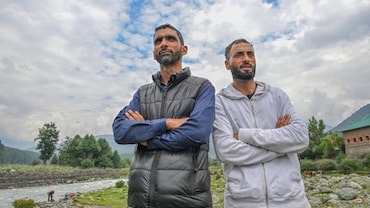- HOME
- /
- True Stories
- /
- Heroes
- /
Lockdown Heroes: Disability Is Never An Obstacle To Fighting Hunger. This Café Shows The Way
MITTI Café, which is run by people with disabilities, demonstrates all you need to help is a bit of kindness
 MITTI Café staffer Sanjit Mondol distributing food to children. Photo: MITTI Café
MITTI Café staffer Sanjit Mondol distributing food to children. Photo: MITTI Café
Twenty seven-year-old Hemant Chand Kumar’s family moved from Nepal to Bengaluru in search of better prospects. For Kumar, finding employment was not easy—he suffers from cerebral palsy. But, one initiative changed so much for him.
MITTI Café, founded in 2017 by 27-year-old Alina Alam, employs people with disabilities. After a few months of personalized training, Kumar’s progress was remarkable. From someone who could not grab a spoon, he is now at the forefront of the ‘MITTI Karuna’ campaign. Kumar helps distribute cooked food to daily-wagers and the homeless, crushed by the COVID-19 lockdown. “We cook and feed people—no one in the world should be hungry,” says Kumar.
MITTI Café taps institutions for space, pro bono or for a nominal rent. As partners, these establishments sponsor setting up of the cafe; post that, it is self-sustaining. Most employees come from underprivileged backgrounds and are often key earning members. MITTI Café has 12 outlets across Karnataka and West Bengal, employing 116 people.
 Hemant Chand Kumar is leading the café's ‘MITTI Karuna’ campaign. Photo: MITTI Café
Hemant Chand Kumar is leading the café's ‘MITTI Karuna’ campaign. Photo: MITTI Café
Like Kumar, the café has scripted several other success stories. Take the Hubli-based Kirti Kale, 25, who suffers from paraplegia and stunted growth. Three-and-a-half-years ago, she arrived for her interview crawling on all fours, since her family couldn’t afford a wheelchair. Kale now manages accounts and a team from a wheelchair.
Also at the Hubli outlet, you will find 29-year-old Rajashekhar Biradi, who is autistic and once homeless. Biradi, an assistant manager, has now helped his mother rent a home. The cheerful Lakshmi, a single mother, with a speech and hearing disability, manages the café’s Bengaluru outlet with panache.
“While many employees live in our accommodation, several were able to return home. We never thought we would be getting into relief work,” says Alam who started the chain to showcase a truly inclusive venture.
The relief idea came from Bengaluru staffer Raju, with an orthopaedic disability—the café’s focus being food, they could collectively contribute to those in need, was his contention. And so, with a team of 23 staff members, was launched the MITTI Karuna campaign in March, post the lockdown. What began with 1,000 cooked meals daily has now grown to 6,000 a day with around 4.5 lakh people receiving relief so far.
A re-negotiation of terms with donors and an ongoing online crowdfunding campaign have helped MITTI Café achieve this. A part of the funding also provides for employees’ salaries and care.
Each day, the relief work in Bengaluru and Kolkata starts at the café’s commercial kitchens. In Bengaluru, for instance, 30-something Gauri Shinde, who is blind and grew up in a shelter, is at the helm of affairs, cutting, chopping and assisting the cooks. She believes that love and compassion is what the country needs now. “It’s not just us, the whole nation needs to stand together,” she says.
 Gauri Shinde is at the helm of affairs at the café's commercial kitchen in Bengaluru during the pandemic. Photo: MITTI Café
Gauri Shinde is at the helm of affairs at the café's commercial kitchen in Bengaluru during the pandemic. Photo: MITTI Café
You will also find the busy Irfan, a 22-year-old wheelchair-bound youngster, who single-handedly supports his younger sister Yasmine, a school student.
The team has a system in place—food stocks are kept in a sanitized space for 48 hours before they are used and later distributed with the help of local police and corporators. There is a lot of care taken to keep the items sanitized and safe.
“People should come out and support a cause, but equally important is the awareness about inclusion,” says Alam. “Even when the cities open up, we plan to continue this initiative with a focus on providing cooked food to the caretakers of migrant patients at hospitals. Our staff, once considered vulnerable, are out there helping others. If we all can inspire people to help in whatever capacity possible, we would consider our job well done,” she says.






